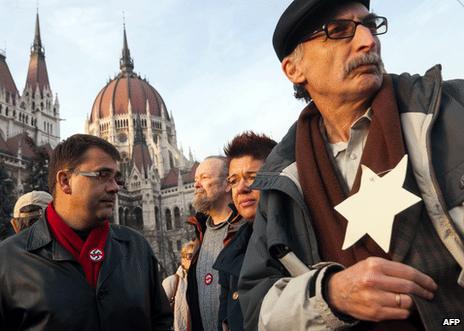Anger in Hungary at prize for 'anti-Semitic' reporter
- Published

Anti-Semitism has led to protests in Hungary
Anger has erupted in Hungary over the award of a prestigious state journalism prize to a TV presenter who is frequently accused of anti-Roma and anti-Semitic comments.
Ferenc Szaniszlo was one of three journalists awarded the Mihaly Tancsics prize last week.
Within hours, Minister for Human Resources Zoltan Balog apologised for what he called "a bad decision".
Israeli Ambassador Ilan Mor was among those to criticise the award.
Mr Mor said the award had been given to "the wrong person for the very wrong reasons".
"While Israel and Hungary are co-operating in fighting against anti-Semitism, such awards might cause a negative impression and lead us in the wrong direction," he said.
Jury 'overruled'
At least a dozen former recipients of the prize have returned their awards in protest against Szaniszlo receiving it.
The choice of two other recipients of national honours on the same day has also been sharply criticised - archaeologist Kornel Bakay for allegedly anti-Semitic comments, and musician Janos Petras of the rock band Karpatia, which is associated with the far-right Jobbik party.
The Mihaly Tancsics prize, named after a prominent 19th Century journalist, is awarded each year on Hungary's national day, 15 March.
In the past, a prize jury has been composed of journalists from both a left-wing association, MUOSZ, and a right wing one, MUK.
On this occasion, no MUOSZ representative was invited, but even the right-leaning jury found the choice of Szaniszlo inappropriate, according to the online version of the centre-right paper Heti Valasz. Someone in the human resources ministry appears to have overruled the jury.
Criticism of Ferenc Szaniszlo's journalism focuses in particular on two comments.
In 2011, Echo TV was fined $2,000 by the Media Authority for anti-Roma comments. In 2009, he suggested that Israel might have to be emptied by 2020, as it had lost its strategic importance in the Middle East.
"But who would want six million Israelis?" he added.
'No time to check'
Government minister Zoltan Balog said he had no time to check the background of the several hundred people to whom he awarded state honours on the eve of the 15 March holiday.
"Szaniszlo's comments stand in opposition to both my own, and the government's principles," Balog wrote on his Facebook page.
"In making the award, I was not aware…of earlier statements by the reporter which offend human dignity. These statements contradict both my own and the government's values."
The Fidesz government has been in trouble before over allegedly anti-Semitic and anti-Roma comments by its supporters, including Zsolt Bayer, a columnist at the daily Magyar Hirlap.
In January, he wrote that "a significant number" of Hungarian Roma were "no better than animals, and deserved to be excluded from society". Mr Bayer has organised three "peace marches" in support of the Fidesz government.
However, Fidesz ministers are also on record for attacking anti-Roma and anti-Semitic remarks. On 4 March, Dora Duro, a spokeswoman for Jobbik, said in parliament that Roma had many children just in order to claim welfare payments.
Prime Minister Viktor Orban described her comments as "pure racism".
- Published27 November 2012
- Published14 March 2013
- Published4 January 2013